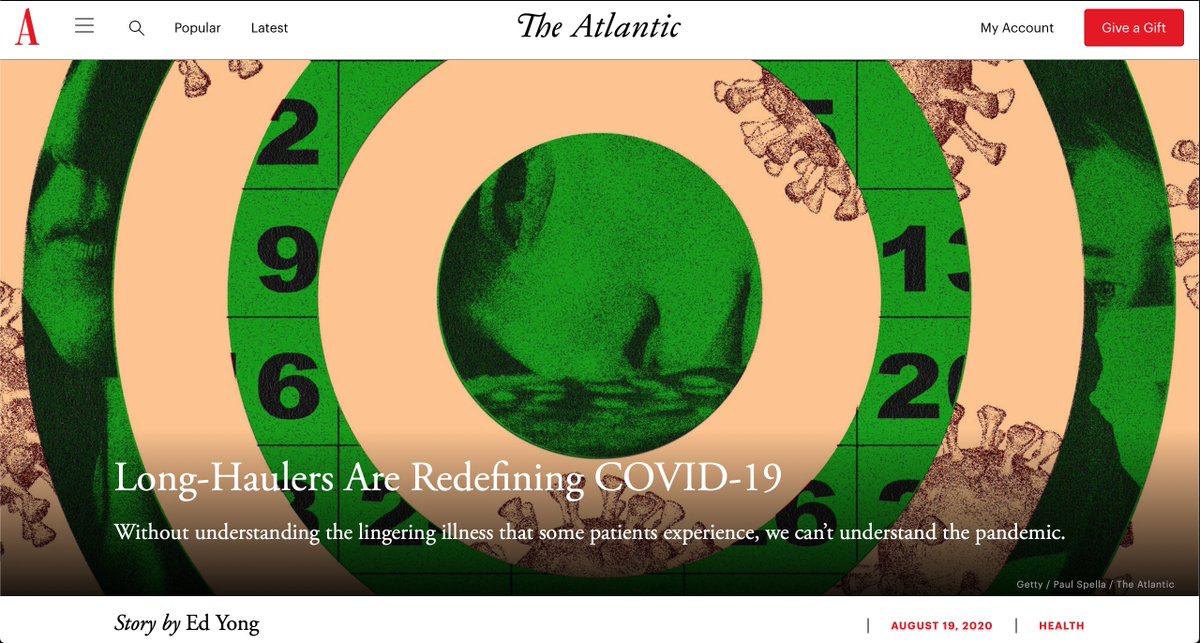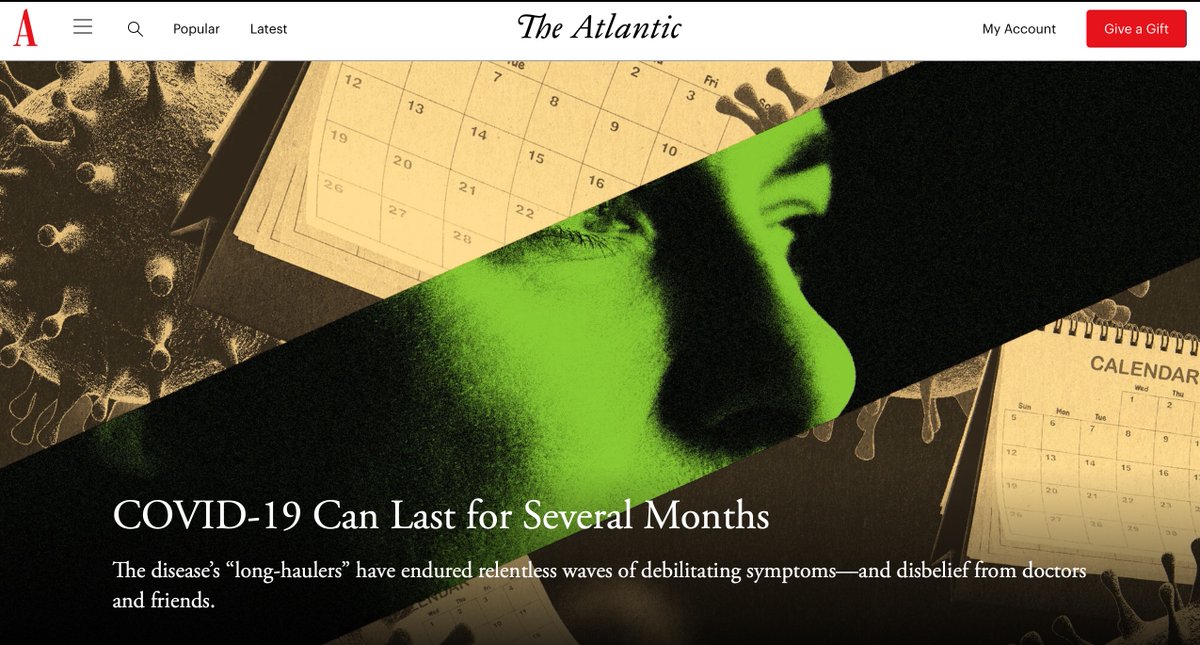Many who had #COVID19 continue to experience complications long after their initial illness.
In this🧵below, I expand on what @angie_rasmussen and I discussed in this @ASlavitt podcast to outline what we do know and what needs to come next...
But that doesn't mean we don't know a lot. We can draw from similar illnesses and the growing body of research, especially the patient-led work being done by #longhaulers themselves.
There’s no formally accepted definition, but post-covid (#LongCovid) includes those who haven't returned to baseline ~3 weeks after the onset of first symptoms.
And chronic covid includes those months out with ongoing symptoms.
hkmj.org/system/files/h…
onlinelibrary.wiley.com/doi/full/10.11…
Enduring fatigue, inability to return to work, and ongoing mental health challenges were incredibly common, in addition to the cardiac, respiratory & neurologic symptoms.
So why are covid long-haulers having such a hard time being taking seriously?
But in a sense, I'm also a long-hauler my self.
But for months I had joint and muscle pains. It hurt to walk. My hair fell out in chunks. All of that got better.
But some things didn't.
The fatigue, 'brain fog', and feeling better some days and worse the next.
"Recovering from a severe case of COVID-19 is not like switching a light on or off. It’s more like a dimmer switch, where the light gets brighter, then darker, then brighter again."
latimes.com/opinion/story/…
So much of what we know about long-haulers is actually from long-haulers themselves.
Groups like Body Politic (@itsbodypolitic) led the first detailed patient surveys and have set up expansive support groups.
patientresearchcovid19.com/research/repor…
cdc.gov/mmwr/volumes/6…
This is particularly concerning as outbreaks emerge at college campuses.
You may have heard about hundreds of cases of multisystem inflammatory syndrome (MISC) affecting children and adolescents, often weeks after a covid infection.
But the impact is bigger.
undark.org/2020/09/02/kid…
Although covid19 is primarily defined by its respiratory pathology - low oxygen, pneumonia, ARDS - it impacts nearly every organ system in one way or the other.
This is true for the acute (early) infection but likely defines the long-term and chronic impacts as well.
We don’t know for sure, but multiple studies have suggest approximately 10% of people experience prolonged illness after covid-19.
At even a fraction of that, the toll is huge.
bmj.com/content/370/bm…
jamanetwork.com/journals/jama/…
To date, covid19 has been associated with many long-term findings, including inflammation of the heart muscle (myocarditis) or the sac around the heart (pericarditis), as well as abnormal heart rhythms. Some may develop cardiomyopathy (♥️ doesn't pump effectively).
That's because a lot of college and professional atheletes have been found to have it after a bout of covid19 -sometimes mild cases - forcing leagues and players themselves to call off the season.
scientificamerican.com/article/covid-…
This one from Wuhan showed majority (15/26) had sustained cardiac involvement at median of 47 days after symptom onset; primarily edema, fibrosis, and impaired ♥️function.
linkinghub.elsevier.com/retrieve/pii/S…
jamanetwork.com/journals/jamac…
Unsurprisingly, given that it’s primarily a respiratory virus, the long-term lung damage from covid19 is substantial.
Emerging data indicate that many patients “experience persistent respiratory symptoms months after their initial illness.”
bmj.com/content/370/bm…
There's also fibrosis (scarring), bronchiectasis (damage to bronchial tubes) and pulmonary vascular disease.
But we also know that those who are put into pulmonary rehabilitation early on have better and faster resolution of underlying damage and symptoms.
eurekalert.org/pub_releases/2…
All of us working on the #covid19 frontlines saw how this disease caused kidney injury or failure in so many patients.
At one hospital in NYC, 46% of patients admitted with Covid-19 had some form of acute kidney injury; of those, 17% required urgent dialysis.
What does nephrologist @scoca1 who took care of many of these patients think about the long-term renal impacts of covid19?:
“The next epidemic will be chronic kidney disease in the U.S. among those who recovered from the coronavirus".
cnbc.com/2020/08/03/sev…
n.neurology.org/content/95/8/e…
A Spanish study showed that over half of covid patients developed neurological problems.
Others have shown more rare presentations - encephalitis, cranial neuropathies, and even myasthenia gravis (a neuromuscular disorder causing weakness).
acpjournals.org/doi/10.7326/L2…
There are multiple case reports of covid19 causing Guillain-Barré, an autoimmune illness witch causes altered sensation and motor function, primarily in the legs and arms.
This was something we saw with Zika infections a few years ago too!
nn.neurology.org/content/7/5/e7…
And there’s been loads of studies about anosmia, or the loss of smell due to covid19.
In many, this was reported in 30-60% of covid cases.
And thankfully most episodes resolve in 2-3 weeks. But symptoms do persist in some beyond that.
hms.harvard.edu/news/how-covid…
In addition to & related to the neurologic impact, the mental health manifestations of long-covid can be profound.
In all “1 in 3 patients recovering...could experience neurological or psychological after-effects of their infections”.
bit.ly/3m1B4Ht
The mental health toll of this pandemic has been hard on everyone. But for #longhaulers the extra stress of being sick & not knowing if/when you’ll feel better is an added burden. Support groups are helping many, but we need more resources.
nytimes.com/2020/09/07/hea…
We need recognition, resources and rehabilitation, and research...
One of the hardest thing for #long-covid patients is actually just being believed that their symptoms are real! They're dismissed as anxiety, or ‘reassured’ they’ll eventually get better. The problem is that for doctors like myself, this is all so new.
Healthcare professionals have a long history of writing off or minimizing conditions characterized by ‘vague’ complaints like fatigue or difficulty breathing, especially when our normal workup is normal.
We often say its just 'anxiety'. But this is different.
We need more insight into how healthcare providers can best help long-covid patients. This includes a 'whole-patient approach' to care.
And we all need to recognize that many people - even many months after their initial illness - may still not be recovered.
In addition to support from family and providers, long-haulers need access to whole-patient care, including specialty providers and early rehabilitation. We know that helps, a lot.
eurekalert.org/pub_releases/2…
We need to make #LongCovid a research priority for medical & public health institutions, including the WHO and CDC.
This won't be confined to the US - patients with long-term covid complications exist all over the world.
We need to study this way more, urgently.
One of the most pressing needs is (as @Dr2NisreenAlwan perfectly puts it here): “We must move long-haul COVID from anecdote to something that is routinely quantified and monitored, as is currently being done with deaths and positive tests.”
thelancet.com/journals/lance…
Another critical call-to-action in her piece:
"We must define and measure what ‘recovery’ means, focusing on how long symptoms last, how severe they are, how they impact someone’s quality of life, and the nature of when and how they appear."
It’s real.
The toll is huge.
And many of those struggling today may still be recovering after this pandemic is over.
We need action to address this now.
This piece by Paul Garner is an honest account of what it’s like trying to ‘accommodate’ long-haul covid-19.
blogs.bmj.com/bmj/2020/09/04…
Also, make sure to follow @itsbodypolitic, @Survivor_Corps, and @LongCovidSOS. There are many others, Ill try to update.
Thanks for making it this far.
Being heard is the first step for many who shared their story with me.
♥️




